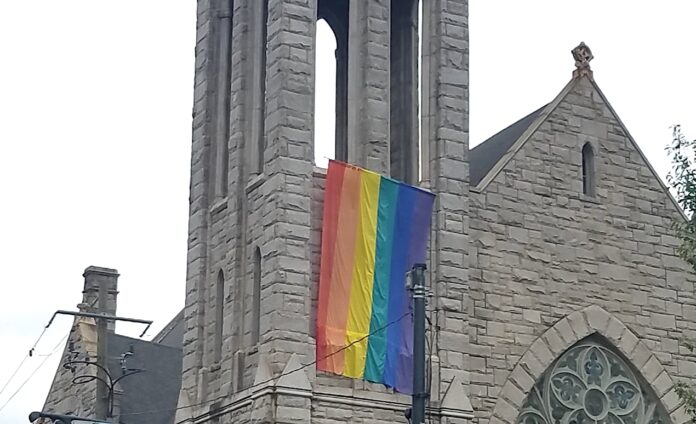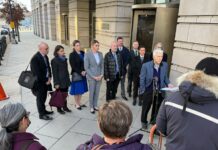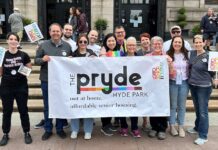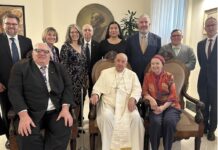Earlier this month, United Methodist Church delegates voted to repeal its church’s long-held exclusionary stance of its LGBTQ Methodists — meaning, church doctrine, polity, and social standing.
The news was received with mixed feelings — cheers and tears.
“We have been Methodist since 1917 in the oldest Black section of Houston,” Harold Cox, an openly African American gay male of Boston, shared with me. “I’m sad because the United Methodist Church is my family’s business.” Cox comes from a supportive and long-line family of United Methodist ministers — three uncles and his father. Cox is a “PK,” a pastor’s kid. “I’m sad the church couldn’t find a way in their differences to find a way to reconcile.
Defrocked and excommunicated clergy
For me, this news is bittersweet. My heart aches at the number of my United Methodist clergy friends through the decades who have been defrocked — either for being LGBTQ+ or supporting LGBTQ rights.
For example, In 1999, the Rev Jimmy Creech, a heterosexual ally, was defrocked for performing same-sex union ceremonies. In 1997, Creech officiated a same-sex union ceremony for a lesbian couple in Omaha. In 1998, the Judicial Council of the United Methodist Church ruled that Creech violated church law. On the eve of his trial, he officiated a recommitment ceremony for a gay male couple in NC.
The Advocate that year asked him why he continued to marry same-sex couples, knowing the church’s position. Creech rightly stated the following: “A cultural prejudice . . . has been institutionalized in the church. The position of the church is wrong; it’s unjust. It’s discriminatory. It isolates a part of our population, part of the brothers and sisters of the human family. It denies their humanity, considers their own humanity to be somewhat unnatural or immoral or sinful.”
During this era, however, not all UMCs shut their doors to LGBTQ+ parishioners. I was instrumental in Union United Methodist Church, a predominately African American church in Boston’s South End — once the epicenter of the city’s LGBTQ community — becoming a Reconciling Congregation, the first in New England. It is the one institution least expected to be lauded among LGBTQ+ people of African descent, given the Black Church’s notorious history of homophobia. When its pastor came out at the General Conference in 2016 to move the global church body’s moral compass against its anti-LGBTQ policies, UUMC was in full support.
Disaffiliation as a means of peace
The bittersweetness of moving the UMC to repeal its theological stance on LGBTQ+ issues is that approximately one-fourth of the denomination’s churches have disaffiliated. Since 2019, 7,600 have left. In January 2020, before COVID, the church had thoughts of splitting. I had hoped that during COVID, the church would have time to reflect as a church body on its decision.
“Maybe it’s a separation that needs to happen,” Cox told me. “Fifty years is a long time to be fighting.”
For decades, the UMC has struggled to adopt a policy of fully including its LGBTQ parishioners, clergy, and all the spiritual gifts we bring to the church.
In 2018, hoping to avoid a schism, the Council of Bishops recommended the One Church Plan, which would grant individual ministers and regional church bodies the decision to ordain LGBTQs as clergy and to perform LGBTQ weddings. It was believed that such a decision on a church-by-church and regional basis would reflect the diversity and affirm the different churches and cultures throughout the global body of UMC.
The One Church Plan, however, was one of three proposed plans by the UMC’s Commission on a Way Forward. The others include the Traditionalist Plan and the Connectional Conference Plan, both exclusionary to LGBTQ parishioners.
Also, The One Church Plan would excise the offensive and controversial language targeted at LGBTQs from the Book of Discipline and replace it with a more compassionate, accurate, up-to-date, and contextualized language about human sexuality in support of the mission and all its parishioners.
In 2022, the Global Methodist Church officially broke from UMC.
However, while the UMC has repealed its stance on LGBTQ+ clergy and removed itscondemnation of LGBTQ+ sexualities and gender expressions from its church law and doctrine, the change does not offer a full-throated endorsement of same-sex marriages. It removes their prohibition.
A smaller church
“The United Methodist Church was an important vehicle supporting colleges and hospitals in my life. That is important,” Cox stated. ” With a smaller church, it’s harder to care for and continue with those activities.”
Although the UMC is a smaller body, LGBTQ+ Methodists can now be fully out in the church. The hope is that many of the disaffected will return. Cox won’t be one of them.
Harold Cox is now an Episcopalian.
Rev. Irene Monroe can be heard on the podcast and standing Boston Public Radio segment “All Rev’d Up” on WGBH (89.7 FM), the Boston affiliate of NPR. Monroe’s syndicated religion columns appear in Bay Windows, Cambridge Chronicle, Dig Boston, Curve and in several cities across the country and in the UK and Canada.
Not a subscriber? Sign up today for a free subscription to Boston Spirit magazine, New England’s premier LGBT magazine. We will send you a copy of Boston Spirit 6 times per year and we never sell/rent our subscriber information. Click HERE to sign up!









